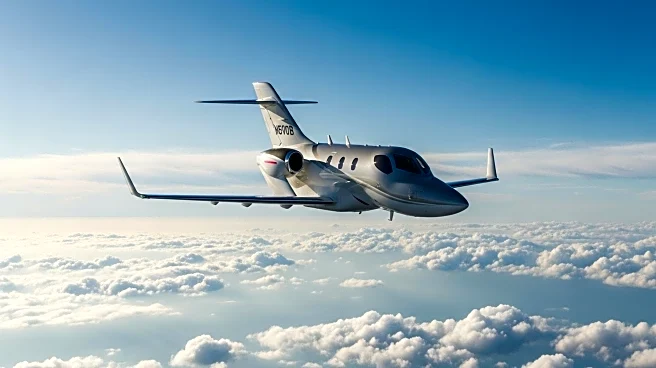What's Happening?
Honda Aircraft has successfully completed a flight test of its HA420 HondaJet using 100% sustainable aviation fuel (SAF). This marks a significant milestone in the use of renewable fuel in aviation, as the test was conducted without any modifications to the aircraft. The flight took place in late September, following previous tests by GE Honda Aero Engines using SAF in the HondaJet's HF120 engine. This demonstration extends the operational capability of the aircraft beyond the previously approved SAF blends of up to 50%. The achievement comes nearly two years after a similar trans-Atlantic flight by a Gulfstream G600 using 100% SAF.
Why It's Important?
The successful use of 100% SAF in the HondaJet represents a significant advancement in sustainable aviation, potentially reducing the carbon footprint of air travel. This development is crucial for the aviation industry as it seeks to meet global environmental targets and reduce reliance on fossil fuels. The milestone could encourage other manufacturers and operators to adopt SAF, promoting broader industry shifts towards sustainability. The achievement also highlights the ongoing innovation in aircraft propulsion technology, which is essential for future regulatory compliance and environmental stewardship.
What's Next?
The aviation industry may see increased interest and investment in SAF technologies following HondaJet's successful demonstration. Regulatory bodies could consider revising guidelines to accommodate higher SAF blends, encouraging more widespread adoption. Airlines and manufacturers might explore partnerships to expand SAF production and distribution, potentially leading to more frequent use in commercial flights. The demonstration could also prompt further research into optimizing engine performance with SAF, paving the way for new technological advancements.
Beyond the Headlines
The use of SAF in aviation raises important ethical and environmental considerations, such as the sourcing and production of biofuels. Ensuring that SAF production does not compete with food resources or lead to deforestation is crucial for its sustainable adoption. Additionally, the shift towards SAF could influence cultural perceptions of air travel, promoting a more environmentally conscious approach among consumers and industry stakeholders.









